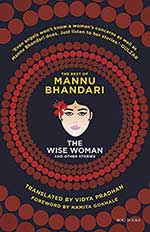Anton Chekhov, analysing the structural elements of a short story, says, ‘writing a short story, therefore, is to write what the characters do, not what they think, or say’ (Friedland 1890). While there is no autobiographical evidence of Chekhov’s influence on Mannu Bhandari’s artistic development, one can see a Chekovian resonance, a kind of literary parallel. In Vidya Pradhan’s rich selection of eighteen stories under review, Bhandari’s characters do negotiate things as they exist. Her narrative canvas substitutes abstract philosophizing with lived realities.
Mannu Bhandari (1931–2021) is a well-known writer even outside Hindi, with her meaningful contribution to the Nayi Kahani (new story) movement and through adaptation of her writing in theatre and on the celluloid. Nonetheless, The Wise Woman carries a highly readable foreword by Namita Gokhale. A crucial trend in Nayi Kahani is to examine the reigning cultural ethos of India’s rising middle-class. Bhandari’s favourite object of inquiry against this backdrop is the (dynamic) position of women, set against changing social mores. Characterizing her (women) characters as individuals, Bhandari brings to the fore their aspirations, anxieties, frustrations, self-centredness, insecurities, and a plethora of other concerns in the rapidly changing world.

